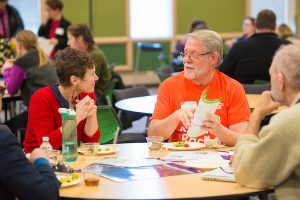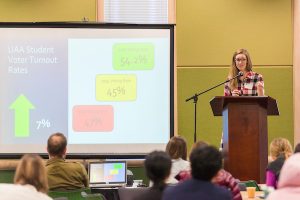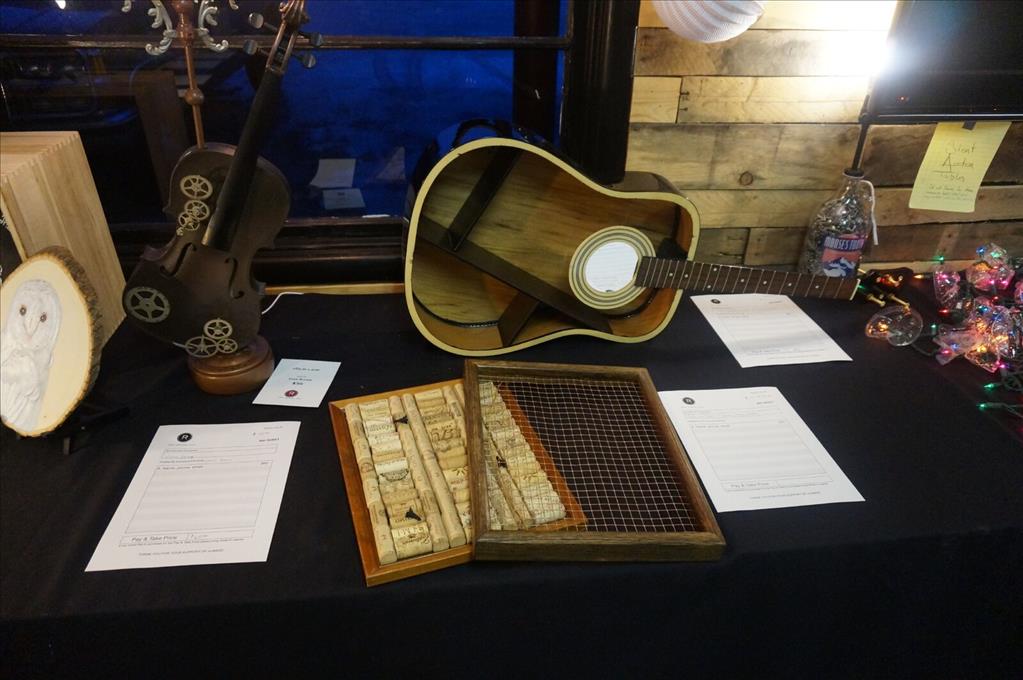Urban and Rural in Alaska Conference draws big crowd, highlights faculty research
by cmmyers |

More than 120 students, faculty and community members attended this year's Urban and Rural in Alaska Conference. (Photo courtesy of UAA Center for Community Engagement and Learning)
Since 2012, UAA's Center for Community Engagement and Learning (CCEL) has hosted an annual conference engaging students, faculty and the public in dialogues centered around social issues. In 2013, CCEL teamed up with assistant professor Bree Kessler who wanted to create a similar campus and community-wide discussion, but to also focus on public spaces. The result? The annual Urban and Rural in Alaska conference, a day-long program that not only facilitates conversations about social issues and public spaces but also provides UAA faculty with a space to present their community engagement projects and collaborations.
According to Judith Owens-Manley, CCEL's director, about 120 students, faculty and members of the public attended this year's conference. The event has steadily been gaining interest since 2013 and registration filled up a few weeks before the conference.
"One of the most fun aspects of the conference is the 'Rapid Fire Community Engagement' over lunch," Judith said. "We hear from about 20 faculty for two minutes each and get the breadth of engagement across the university as a sample of the community partnerships that we have here at UAA."
After the Rapid Fire segment, a 'Report from the Field' is presented-a longer, in-depth project that has been more fully developed in the previous year. This year's report came from Journalism and Communication Department term professor, Marsha Schirack-Olson.

Journalism and Communication Department term professor Marsha Schirack-Olson presents her Fundamentals of Oral Communication class project on raising voter issues and registration among millennial students at UAA. (Photo courtesy of UAA Center for Community Engagement and Learning)
Her project focused on solving the question of why millennials are the least likely to participate in the voting process. It's a question that has many people from older generations scratching their heads-Marsha's too-which is why she tasked several of her Fundamentals of Oral Communication class with setting out to answer this question and find a solution.
"The class identified three key goals," Marsha said. "Increasing voter registration (among millennials), educating young voters and increasing young voter turnout." Her class partnered with the League of Women voters who helped provide education to her students in how to approach people about registering to vote and ballot issues.
What Marsha and her class discovered not only surprised her but her students as well.
"Millennials feel a general lack of education when it comes to voting," she said, which included everything from how to register to vote, to finding information about issues on the ballot. This feeling of being unable to find voter information led only 47 percent of UAA students ages 18-29 to vote in the 2012 election. So Marsha and her class spent the 30 days before the 2016 election registering students to vote, as well as creating researched and cited informational brochures to hand out to students on the ballot issues the day before the official election.
Marsha's semester-long project has covered the spring and fall 2016 semesters, as well as the spring and fall 2017 semesters. As of October 2017, Marsha's classes have registered approximately, 550 UAA student-voters, with a total of 71 percent of UAA students registered to vote as of 2016 and a 5.3 percent increase in early voting.
Marsha said she was pleasantly surprised by her class's results. To keep the momentum going, she would like to continue campus voter registration events, collaborate with UAA departments outside of the Journalism and Communication Department and move this project outside of UAA, into the Anchorage community, to help sign up and engage young voters in the election process.
Marsha's project was one of 21 projects that were presented, with some that have already been completed in the previous school year and some that are slated to begin in 2018. The annual conference, according to Judith, is to showcase CCEL's urban projects in Anchorage, as well as in the statewide community. The added benefit, Judith said, is that the conference brings together students, faculty, staff and community members to highlight, connect and further the work that UAA and CCEL are doing to address the social and urban issues our community faces.
Written by Catalina Myers, UAA Office of University Advancement
 "Urban and Rural in Alaska Conference draws big crowd, highlights faculty research" is licensed under a Creative Commons Attribution-NonCommercial 4.0 International License.
"Urban and Rural in Alaska Conference draws big crowd, highlights faculty research" is licensed under a Creative Commons Attribution-NonCommercial 4.0 International License.














